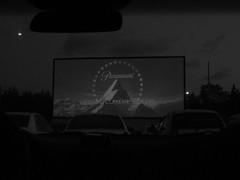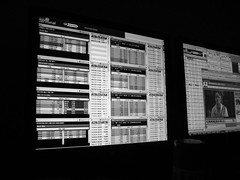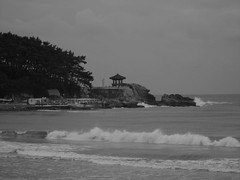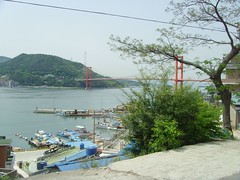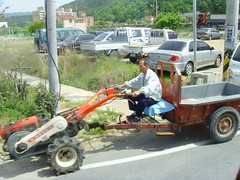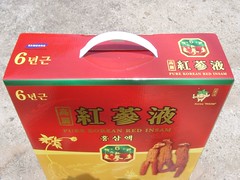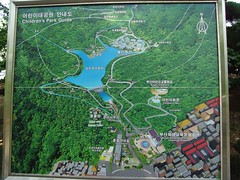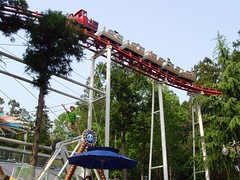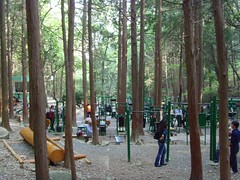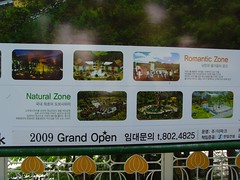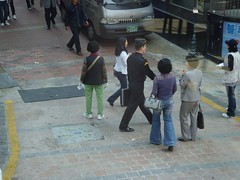Inevitably, the order of our little republic has broken down as our time in Korea has reached its conclusion, and we have both liberally indulged ourselves, while forces beyond our control simultaneously conspired against us in our final days in May.
There has been the rush of buying presents to take with us, winding down our work, saying goodbye to the friends we have made in this country, and a last desperate attempt to somehow fit a few more experiences into my time here, which relative to my life back in England, was already more than I could ever write about, let alone fully comprehend. Broken cameras, almost broken ankles, unexpected medical complications and billiard tournaments have, in the end, been obstacles which have not stopped us rushing around Busan every day accomplishing our goals, but it has meant there was much more to say about my time here than I managed to document.
The imminent overthrow of my Korean life and its enforced replacement by a British one, has served to concentrate my mind in a way that living in Korea without the threat of change has not. I have been asked by friends if I am looking forward to going back home, but as I have written here before, when you find your own Government acting outside the law, and have to fight it in front of a judge to uphold the freedom you believed to be self-evident, it doesn't quite feel like home any more. But it goes further than that. After all this time, my old life seems like it existed a long time ago, and I find myself struggling to remember the details. What did I used to eat? Where did I used to go, and what did I used to do? These are all questions which can no longer be automatically answered, but instead require rummaging through thoughts which have been buried under layers of Korean experiences. I will of course adjust, and then it will be the turn of the Korean memories to sink beneath the layer of confusion which encountering British bureaucracy tends to create in the mind. I always knew this would be the case, which is one of the main reasons I started writing this blog all those months ago.
Another thing which has concentrated my mind has been a medical condition. I have been a little unwell of late and I was going to wait until I went back to England to get a diagnosis, but instead we made the time to walk into a small specialist hospital a couple of days ago. I was told what I probably have fifteen minutes later having been tested almost immediately. While it's not necessarily serious it isn't to be treated lightly either, and it's going to take time to fight it. I was told that the condition often comes about through either stress, exhaustion or heavy drinking. While the latter is almost a running theme in Korea, ironically this is the one reason out of the three that I can categorically rule out. The other two have been part of my life for years though, so clearly I need to have a re-think. But the immediate lesson is the immediacy of a diagnosis and treatment that would have taken weeks to initiate in the UK. Someone once said that Britain is the best country to be sick in if you're poor, but Korea is the best country to be sick in if you're not, and since I'm in the 90% rather than the bottom ten, I'm about to swap fast and great medical care for extremely slow care of moderate quality, which is unfortunate.
So am I looking forward to going home? My answer then is no. I've enjoyed my time in this country, and the lifestyle I've had here as a consequence. I've enjoyed it much more than the life I had before I arrived. I've read that there are two types of expatriate, those that live abroad out of necessity and look forward to their return, and those that realise that they never want to go back. I've realised I probably fall into the latter category. I do of course miss friends and family, and there are certain foods I miss, but the pull of the experiences of the last seventeen months are strong. It's not to say that everything here is OK. It isn't, and clearly some people's experience will vary. I haven't taught English here but I'm well aware that it can prove incredibly frustrating, and while I have felt free to walk the streets alone at night - even as a foreigner - in a way I couldn't do in my own city in England, I know that this does not necessarily hold true for foreign women. In the end though, in all my time here I have met and talked to one foreigner, and that was only for fifteen minutes, so aside from that and a brief appearance on a Seoul Podcast I can't speak in any detail of the wider foreigner experience.
I hope I've tried to portray a positive image of foreigners during my time moving within Korean society, and insofar as one of our friends says that she would now consider dating foreigners, and a couple of friends have said they are no longer scared of foreigners, I guess I've have had some influence. But despite my integration with Korean society, I've failed to integrate with it. I have a working vocabulary of 600 words which means I can often make myself understood, but often can't follow the conversations going on around me in plain-form Busan accent and dialect. Busan is not the easiest place to learn Korean, but I've spent a lot of time working here and that's something I wish hadn't happened. If I could do it all over again, I'd have foregone the work, faced the financial consequences, and strived for fluency and the ability to truly function independently in this country, rather than rely on my companions to do the talking.
I have to go back to England and circumstances mean that whatever I think right now, I might never return to live in Korea. Life is complicated. I have to keep studying the language and ironically, now I'm not spending my life running around Busan I may have more time to do it. Certainly, should I ever return here, my goal is to return with some kind of fluency in Korean; if I were to return without this I think I would be increasingly unhappy here despite my experience before now. It's already been playing on my mind a lot in recent months.
I don't know what the future holds and clearly my priorities are about to change. I will probably return to this blog to write up some of the experiences which got lost amidst the chaos, but this will be my last entry in Korea. I started writing this mostly for myself and didn't expect to end up with around a hundred people a day reading it, which was a bit of a shock and not necessarily in a positive way. Still, I hope that you have enjoyed reading it and that it has provided you into some insight into Korean life and one person's time in Korea.
Tuesday, May 13, 2008
Monday, May 12, 2008
Exit Napoleon Pursued by Rabbits
I am of course an actor, playing a part, and I have been since I got here. I always knew this was the way it would be, and it's one of the reasons I chose to title every entry in this blog after a dramatic work. Free will or fate? You know my answer, and as Laplace's demon has inevitably revealed itself as my time in Busan unfolded, I have followed the script as it has been delivered to me, trying my best to fade into the background as an extra, but all the while feeling I was being watched as though I was walking centre-stage.
Standing outside the theatre on the Kyungsung University campus where a film crew is hovering, I felt the inevitability of them being drawn towards me, and a minute later I am once again stood next to a student union building giving an interview - different country, same modus operandi - smile, be diplomatic, don't start a riot.
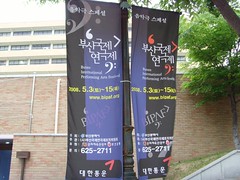

What do I think of the festival so far? Let me explain how my life works here - "There's a mime, do you want to go? OK." Context often comes in retrospect, and I'm usually far too busy to worry about something until it happens. So I've seen some banners for the Busan International Performing Arts Festival, quickly put two and two together, and explain how this is my first event so I really don't have a view yet, but how I'm sure it's great for Busan and a good way of promoting the city internationally. Please don't ask any deeper questions about what I'm here to watch because the first time I glanced at the script was a couple of hours ago and I certainly haven't studied it in any detail.
We are here to see Exit Napolean Pursued By Rabbits, performed - I discover once I get home - by Nola Rae, or rather, Nola Rae MBE - making her a Member of the Order of the British Empire, which is more than I'll ever be, particularly if I keep taking the Empire to court. Which is all to say that Nola Rae is moderately well-known, and certainly well-respected back home in the Empire, so this then, is no ordinary mime.
Before this revelation I'm just hoping that attending doesn't transpire to be a mistake. I've arrived in a group with twelve other people and I've been told the mime is British. so even though this wasn't my idea I can't help feeling that like everything else which is British in Korea, it reflects on me to some extent. I needn't have worried though, because the Koreans apparently loved it, despite some finding themselves dragged onto the stage. They should be used to it anyway, because I have yet to attend anything here where there members of the audience weren't conscripted as part of the entertainment. I always try my best to appear invisible at these points; I'm already on the stage in Korea without being on it literally, and I only want to carry the metaphor so far. But here's a tip if you don't want your fifteen minutes of fame here, don't sit on the front row. I suppose that's life all over. Participation eventually extended to the whole audience, which evidently wasn't to The Times of London's liking, but as Ms. Rae made puppets of us all from the stage, I thought surely this was the point. Did we refuse to stand, to gesture, to make fools of ourselves or was it easier to go along with arbitrary and illogical diktats of someone commanding the majority? After the show, it was our hosts turn to be on the spot as an audience member suddenly burst out that it was Children's Day in Korea the next day and 'requested' that the performer pose for pictures with all the children in the audience. Exit Napoleon had demonstrated how quickly one dictator can be fall and be replaced by another, perhaps in more ways than one.
I've never sat through 75 minutes of mime before, unless you count two years I worked under an old boss, so I wasn't sure it would appeal to me, although it held my interest - and not just because the material seemed vaguely autobiographical. But while we cycled through various European dictators some uncertainty was voiced to me afterwards as to how many of the references the local audience picked up on. It's easy to grow up with a Euro-centric view of history and not appreciate how the 'important global events' taught in school turn out to be merely important European ones, with little coverage of, or meaning to, our Asian peers. In the question and answer session which followed the performance someone asked about the genesis of the work and Nola Rae commented on the importance of opposing dictators, a message which does, however, have a particular resonance here.
On the way out the film crew caught me again and once again I offered my diplomatic answers. For some reason, this time they were quite keen for me to say 'something unknown... fighting!' to the camera, where the something unknown is presumably the name of whatever group they belonged to. So one moment we are condemning dictators and the next we are shouting 'Korea Fighting!' or whatever other cause you want to rally people's base emotions to. It seems we walk a fine line indeed. I did it of course; it was in the script.
Standing outside the theatre on the Kyungsung University campus where a film crew is hovering, I felt the inevitability of them being drawn towards me, and a minute later I am once again stood next to a student union building giving an interview - different country, same modus operandi - smile, be diplomatic, don't start a riot.


What do I think of the festival so far? Let me explain how my life works here - "There's a mime, do you want to go? OK." Context often comes in retrospect, and I'm usually far too busy to worry about something until it happens. So I've seen some banners for the Busan International Performing Arts Festival, quickly put two and two together, and explain how this is my first event so I really don't have a view yet, but how I'm sure it's great for Busan and a good way of promoting the city internationally. Please don't ask any deeper questions about what I'm here to watch because the first time I glanced at the script was a couple of hours ago and I certainly haven't studied it in any detail.
We are here to see Exit Napolean Pursued By Rabbits, performed - I discover once I get home - by Nola Rae, or rather, Nola Rae MBE - making her a Member of the Order of the British Empire, which is more than I'll ever be, particularly if I keep taking the Empire to court. Which is all to say that Nola Rae is moderately well-known, and certainly well-respected back home in the Empire, so this then, is no ordinary mime.
Before this revelation I'm just hoping that attending doesn't transpire to be a mistake. I've arrived in a group with twelve other people and I've been told the mime is British. so even though this wasn't my idea I can't help feeling that like everything else which is British in Korea, it reflects on me to some extent. I needn't have worried though, because the Koreans apparently loved it, despite some finding themselves dragged onto the stage. They should be used to it anyway, because I have yet to attend anything here where there members of the audience weren't conscripted as part of the entertainment. I always try my best to appear invisible at these points; I'm already on the stage in Korea without being on it literally, and I only want to carry the metaphor so far. But here's a tip if you don't want your fifteen minutes of fame here, don't sit on the front row. I suppose that's life all over. Participation eventually extended to the whole audience, which evidently wasn't to The Times of London's liking, but as Ms. Rae made puppets of us all from the stage, I thought surely this was the point. Did we refuse to stand, to gesture, to make fools of ourselves or was it easier to go along with arbitrary and illogical diktats of someone commanding the majority? After the show, it was our hosts turn to be on the spot as an audience member suddenly burst out that it was Children's Day in Korea the next day and 'requested' that the performer pose for pictures with all the children in the audience. Exit Napoleon had demonstrated how quickly one dictator can be fall and be replaced by another, perhaps in more ways than one.
I've never sat through 75 minutes of mime before, unless you count two years I worked under an old boss, so I wasn't sure it would appeal to me, although it held my interest - and not just because the material seemed vaguely autobiographical. But while we cycled through various European dictators some uncertainty was voiced to me afterwards as to how many of the references the local audience picked up on. It's easy to grow up with a Euro-centric view of history and not appreciate how the 'important global events' taught in school turn out to be merely important European ones, with little coverage of, or meaning to, our Asian peers. In the question and answer session which followed the performance someone asked about the genesis of the work and Nola Rae commented on the importance of opposing dictators, a message which does, however, have a particular resonance here.
On the way out the film crew caught me again and once again I offered my diplomatic answers. For some reason, this time they were quite keen for me to say 'something unknown... fighting!' to the camera, where the something unknown is presumably the name of whatever group they belonged to. So one moment we are condemning dictators and the next we are shouting 'Korea Fighting!' or whatever other cause you want to rally people's base emotions to. It seems we walk a fine line indeed. I did it of course; it was in the script.
Thursday, May 08, 2008
And the Rock Cried Out, No Hiding Place
Today is Parents' Day in South Korea - but it's not a public holiday, unlike Children's Day. This year, the occasion has approximately coincided with our departure from this country, so it was a given that we would visit Korean Grandfather on Namhae Island to pay our respects before leaving.
During my time here I have worked long hours, so even though I've been here since October 2006, and perhaps despite the impression 339 entries in this blog might create to the contrary, my experiences in Korea are more limited than I would have liked them to be. So I'm counting off each one of the days left before I leave and trying to get the most out of it. Under the circumstances, I was not terribly pleased to have to spend one of them on a Namhae trip. But that's family obligations for you - they are usually non-negotiable.
Unfortunately I had been quite ill the day before Namhae, and the next morning nothing had changed. But that doesn't make any difference. You go, and if you don't, you'd better have a good excuse - like being dead for example. On the other hand, Korean Brother is back in Busan from Jeju Island where he works these days. Curiously he did not accompany us, and at the bus station I made the observation to my wife:
"Korean Brother not coming then"
"No"
"Ironic"
"Hmm".
And it is ironic. I rather fear I have become first son by proxy in my Korean family and this status may confer on me the same kind of responsibilities which have seen Korean Father uproot himself to Namhae to live with his father in perpetuity, because in this society, that's the kind of thing you can find yourself morally committed to do. I'm never going to go that far, but the big question in my mind during my time in Korea was whether the responsibilities and obligations which come with being a member of a Korean family were going to cause me to snap and create an ugly cultural incident from which there's no real recovery. Sometimes I think I'm not cut out for this.
We set off for Namhae just before 9am, and arrived at midday via the customarily bumpy bus with faulty (i.e. non-existent) air-con which meant that the heavy smell of Kimchi only got worse as the journey progressed. The urban sprawl of Busan finally disappeared, and gradually the highway makes way for narrower roads passing by field after field of Korean agricultural workers of moderate means, before you finally hit Namhae, which is where you start seeing the local Hell's Angels in earnest.
We arrived at Korean Grandfather's house at midday, and Korean Mother presented our gifts of expensive Samsung Insurance guaranteed Ginseng before we ate lunch together outside - so when I say together, I mean with the flies.
There came a point at which I was sat alone on a wooden veranda at the edge of the enclosed yard, and despite the heat, flies and strange insects which Korean Father insists have invaded Korea, it all seemed very peaceful. And then it struck me why - this could have been the first time in months that there was nothing I could do apart from sit and absorb the scenery, and it marked a real change from working and rushing around from one place to the next which has pretty much been my entire life in this country. Perhaps Korean Father is unhappy about living in Namhae but I left the island thinking that there were worse places to spend one's retirement. But then again, maybe I need the chaos of Busan, and Korean Father is the same.
After a short walk around the local farmers' fields where they were growing cacti amongst other things, we left at 2.30pm, and got back to the city just after six. Which meant we'd spent almost seven hours travelling for a two and a half hour visit. But sometimes that's what you have to do.
During my time here I have worked long hours, so even though I've been here since October 2006, and perhaps despite the impression 339 entries in this blog might create to the contrary, my experiences in Korea are more limited than I would have liked them to be. So I'm counting off each one of the days left before I leave and trying to get the most out of it. Under the circumstances, I was not terribly pleased to have to spend one of them on a Namhae trip. But that's family obligations for you - they are usually non-negotiable.
Unfortunately I had been quite ill the day before Namhae, and the next morning nothing had changed. But that doesn't make any difference. You go, and if you don't, you'd better have a good excuse - like being dead for example. On the other hand, Korean Brother is back in Busan from Jeju Island where he works these days. Curiously he did not accompany us, and at the bus station I made the observation to my wife:
"Korean Brother not coming then"
"No"
"Ironic"
"Hmm".
And it is ironic. I rather fear I have become first son by proxy in my Korean family and this status may confer on me the same kind of responsibilities which have seen Korean Father uproot himself to Namhae to live with his father in perpetuity, because in this society, that's the kind of thing you can find yourself morally committed to do. I'm never going to go that far, but the big question in my mind during my time in Korea was whether the responsibilities and obligations which come with being a member of a Korean family were going to cause me to snap and create an ugly cultural incident from which there's no real recovery. Sometimes I think I'm not cut out for this.
We set off for Namhae just before 9am, and arrived at midday via the customarily bumpy bus with faulty (i.e. non-existent) air-con which meant that the heavy smell of Kimchi only got worse as the journey progressed. The urban sprawl of Busan finally disappeared, and gradually the highway makes way for narrower roads passing by field after field of Korean agricultural workers of moderate means, before you finally hit Namhae, which is where you start seeing the local Hell's Angels in earnest.
We arrived at Korean Grandfather's house at midday, and Korean Mother presented our gifts of expensive Samsung Insurance guaranteed Ginseng before we ate lunch together outside - so when I say together, I mean with the flies.
There came a point at which I was sat alone on a wooden veranda at the edge of the enclosed yard, and despite the heat, flies and strange insects which Korean Father insists have invaded Korea, it all seemed very peaceful. And then it struck me why - this could have been the first time in months that there was nothing I could do apart from sit and absorb the scenery, and it marked a real change from working and rushing around from one place to the next which has pretty much been my entire life in this country. Perhaps Korean Father is unhappy about living in Namhae but I left the island thinking that there were worse places to spend one's retirement. But then again, maybe I need the chaos of Busan, and Korean Father is the same.
After a short walk around the local farmers' fields where they were growing cacti amongst other things, we left at 2.30pm, and got back to the city just after six. Which meant we'd spent almost seven hours travelling for a two and a half hour visit. But sometimes that's what you have to do.
Tuesday, May 06, 2008
A Grand Day Out with Wallace and Gromit
During my time in Busan, I've found there are areas of this city where foreigners are ubiquitous, and then there are other areas which are more exclusively Korean, and your chances of seeing another obviously foreign face are quite low. By this admittedly very rough and ready measure, Busan's Children's Grand Park would have to fall into the latter category, given that last Saturday I must have seen several thousand Koreans there during the course of the day, and the total number of obvious foreigners (i.e. non-Asian in appearance at least), not including myself, amounted to one. Since he, like me, seemed to be part of a Korean family, it's possible that the Grand Park is way off the tourist trail, especially considering it was a five-day holiday weekend (Monday was Children's Day), and in theory at least, the foreigner teaching community should have been freed from the bondage of their hagwons and were out running loose in the wild.
Recently, the temperature here has been rising into the uncomfortable range which merely forebodes the arrival of even more oppressive degrees of heat as the real summer rapidly approaches. They say Korea is famous for its four seasons, but forgive me if I blinked and missed the spring this year, because it only seems a few weeks ago that it was snowing in Busan. Under the circumstances, I was concerned about visiting a park, which being English evokes images of gardens and wide open spaces. But my fears of getting sunburned were misplaced - the Children's Grand Park is a heavily forested affair and wonderfully cool compared with exposed exterior.
After being here for almost a year-and-a-half, I would have to say Korean tourism and leisure often seems to be a case of 'almost, but not quite'. It's as though the Government recognises that it's important to provide public facilities and even try and promote them to foreigners as part of 'Korea Sparking' (the promotional branding inspired by Korea's ubiquitously questionable electrical wiring), but somehow the authorities seem to fail in a way which Koreans probably don't see but which a foreigner would probably raise their eyebrows at. In the Children's Grand Park, this means that a bridge across a river, which in a Japanese park might be a faux-period wooden construction, is a functional concrete affair with a satellite dish attached to it so a nearby food vendor can watch TV as they sell their high-mark-up drinks to their captive audience. An overhead cable strung across the lake - which used to be Busan's main reservoir and is supposed to be shaped like a map of Korea - detracts from what might otherwise be an unspoilt picturesque view.
But none of this detracts from the reality that overhead cables notwithstanding, the smell of relatively pristine forest on a warm spring day marks an excellent alternative to breathing Busan's otherwise polluted atmosphere. And for those seeking a little more excitement in their lives than a quiet walk through the woods with hundreds of Koreans, the Children's Grand Park has a small amusement park with roller-coaster and some other rides.
While the younger people catapulted themselves around the forest at high-speed, the older Koreans were to be found playing badminton and using the public equipment in a nearby public exercise area.
Meanwhile, in this Children's Park, the young children themselves were being posed for photographs beneath the statue Park Jae-hyuk - 'one of the greatest patriots in Korea' says the description (he threw a bomb at the head of Busan Police Station under the Japanese occupation).
But in the name of making love, not war, the park may also provide a home for equally clandestine activities if the graffitied claims of sex in some of the picnic areas are anything to go by.
This is probably not what the park authorities have in mind when they launch their 'Romantic Zone' area next year.
Recently, the temperature here has been rising into the uncomfortable range which merely forebodes the arrival of even more oppressive degrees of heat as the real summer rapidly approaches. They say Korea is famous for its four seasons, but forgive me if I blinked and missed the spring this year, because it only seems a few weeks ago that it was snowing in Busan. Under the circumstances, I was concerned about visiting a park, which being English evokes images of gardens and wide open spaces. But my fears of getting sunburned were misplaced - the Children's Grand Park is a heavily forested affair and wonderfully cool compared with exposed exterior.
After being here for almost a year-and-a-half, I would have to say Korean tourism and leisure often seems to be a case of 'almost, but not quite'. It's as though the Government recognises that it's important to provide public facilities and even try and promote them to foreigners as part of 'Korea Sparking' (the promotional branding inspired by Korea's ubiquitously questionable electrical wiring), but somehow the authorities seem to fail in a way which Koreans probably don't see but which a foreigner would probably raise their eyebrows at. In the Children's Grand Park, this means that a bridge across a river, which in a Japanese park might be a faux-period wooden construction, is a functional concrete affair with a satellite dish attached to it so a nearby food vendor can watch TV as they sell their high-mark-up drinks to their captive audience. An overhead cable strung across the lake - which used to be Busan's main reservoir and is supposed to be shaped like a map of Korea - detracts from what might otherwise be an unspoilt picturesque view.
But none of this detracts from the reality that overhead cables notwithstanding, the smell of relatively pristine forest on a warm spring day marks an excellent alternative to breathing Busan's otherwise polluted atmosphere. And for those seeking a little more excitement in their lives than a quiet walk through the woods with hundreds of Koreans, the Children's Grand Park has a small amusement park with roller-coaster and some other rides.
While the younger people catapulted themselves around the forest at high-speed, the older Koreans were to be found playing badminton and using the public equipment in a nearby public exercise area.
Meanwhile, in this Children's Park, the young children themselves were being posed for photographs beneath the statue Park Jae-hyuk - 'one of the greatest patriots in Korea' says the description (he threw a bomb at the head of Busan Police Station under the Japanese occupation).
But in the name of making love, not war, the park may also provide a home for equally clandestine activities if the graffitied claims of sex in some of the picnic areas are anything to go by.
This is probably not what the park authorities have in mind when they launch their 'Romantic Zone' area next year.
Friday, May 02, 2008
Mutual Appreciation
When I last went to the Busan Immigration Office, we were told that my F2 Visa could only be extended until August of this year, which was when my passport expired. After we won our legal case against the British Government, there was little reason to extend my F2 and I certainly had no desire to renew my passport using the Embassy in Seoul, which I now have a complete lack of trust in.
As the date of our departure nears, I happened to be checking my passport when I noticed that I had no Korean immigration stamp in it for my last extension, and after our troubles with the British immigration authorities, I was anxious to ensure that there were no unexpected complications during my departure, or indeed next time we returned to this country. In fact, when we bought tickets to return to England two returns on a special offer worked out at the same price as two singles, so we booked a return in January 2009.
A phone helpline advised us to get some paperwork from the local District Office and go to the Immigration Office, where surprisingly the unstamped passport was not at issue, and in fact there was an unexpected offer to extend my F2 visa for another year, expiring passport notwithstanding. This didn't really seem to be consistent with the earlier experience but I wasn't complaining. In another revelation we were also told there was no cost for this multiple re-entry visa, which seemed unlikely, considering that we'd paid over £500 (about 994,000 won) for the same thing from the British Government. My wife was rather taken aback by this but the immigration official was quite certain - tapping away and a section of her rulebook which being in Korean I just had to assume represented the relevant guideline. This is where things got more interesting.
Apparently, Korea has a reciprocal agreement with Britain covering these visas, or at least, it thinks it does, under which Koreans should be afforded the same treatment and conditions by the UK immigration authorities as British people in Korea, so my wife related the £500 costs and one or two other aspects of her visa conditions. Cue a serious look from the Korean official and an announcement that they were going 'to report this'.
I felt that I was also be looked at for some kind of explanation of the inequitable treatment of Koreans by my Government, when compared to the entirely fair and understanding way I had been treated by my hosts. But I had none. Unfortunately my Korean is nowhere near the level of being able to explain that the British Government's overseas embassies operate in an institutionally racist way as a matter of Government policy, the goal of which is to keep out as many foreigners as possible while still vaguely appearing to comply with European Human Rights legislation. So I had to shrug my shoulders at the official and say '나쁜 정부' (bad Government), which doesn't nearly do things justice and is a poor substitute for 'institutional racism', the Korean for which I really ought to learn. I noticed a poster hanging on the wall 'Human Rights Violation Hotline'. Ironic.
Anyway, I get my new extended visa in a week and bizarrely, if we can bring a baby with us next time they could extend it for longer than normal. I couldn't tell if the immigration official was joking or not - something to worry about then.
Meanwhile, I'd like to indulge in the fantasy that the way my Korean wife was interrogated and summarily refused entry into the UK by the British Embassy might provoke a minor diplomatic incident behind the scenes of 'the strong relationship between our two countries', because I've often wondered how the British Government and its people would feel if other countries started to refuse entry to British citizens were the roles to be reversed. But somehow, I expect there's just been a misunderstanding in Korea - the UK immigration authorities will continue to harass foreigners applying for visas as a matter of policy, while the Korean immigration authorities labour under the illusion that their treatment of people in my position will be reciprocated back home with Korean citizens (it won't).
As the date of our departure nears, I happened to be checking my passport when I noticed that I had no Korean immigration stamp in it for my last extension, and after our troubles with the British immigration authorities, I was anxious to ensure that there were no unexpected complications during my departure, or indeed next time we returned to this country. In fact, when we bought tickets to return to England two returns on a special offer worked out at the same price as two singles, so we booked a return in January 2009.
A phone helpline advised us to get some paperwork from the local District Office and go to the Immigration Office, where surprisingly the unstamped passport was not at issue, and in fact there was an unexpected offer to extend my F2 visa for another year, expiring passport notwithstanding. This didn't really seem to be consistent with the earlier experience but I wasn't complaining. In another revelation we were also told there was no cost for this multiple re-entry visa, which seemed unlikely, considering that we'd paid over £500 (about 994,000 won) for the same thing from the British Government. My wife was rather taken aback by this but the immigration official was quite certain - tapping away and a section of her rulebook which being in Korean I just had to assume represented the relevant guideline. This is where things got more interesting.
Apparently, Korea has a reciprocal agreement with Britain covering these visas, or at least, it thinks it does, under which Koreans should be afforded the same treatment and conditions by the UK immigration authorities as British people in Korea, so my wife related the £500 costs and one or two other aspects of her visa conditions. Cue a serious look from the Korean official and an announcement that they were going 'to report this'.
I felt that I was also be looked at for some kind of explanation of the inequitable treatment of Koreans by my Government, when compared to the entirely fair and understanding way I had been treated by my hosts. But I had none. Unfortunately my Korean is nowhere near the level of being able to explain that the British Government's overseas embassies operate in an institutionally racist way as a matter of Government policy, the goal of which is to keep out as many foreigners as possible while still vaguely appearing to comply with European Human Rights legislation. So I had to shrug my shoulders at the official and say '나쁜 정부' (bad Government), which doesn't nearly do things justice and is a poor substitute for 'institutional racism', the Korean for which I really ought to learn. I noticed a poster hanging on the wall 'Human Rights Violation Hotline'. Ironic.
Anyway, I get my new extended visa in a week and bizarrely, if we can bring a baby with us next time they could extend it for longer than normal. I couldn't tell if the immigration official was joking or not - something to worry about then.
Meanwhile, I'd like to indulge in the fantasy that the way my Korean wife was interrogated and summarily refused entry into the UK by the British Embassy might provoke a minor diplomatic incident behind the scenes of 'the strong relationship between our two countries', because I've often wondered how the British Government and its people would feel if other countries started to refuse entry to British citizens were the roles to be reversed. But somehow, I expect there's just been a misunderstanding in Korea - the UK immigration authorities will continue to harass foreigners applying for visas as a matter of policy, while the Korean immigration authorities labour under the illusion that their treatment of people in my position will be reciprocated back home with Korean citizens (it won't).
Thursday, May 01, 2008
The Uniform Motion of Folly
South Korea is a modern society, but it's also technically still at war with its neighbour to the North, so you have to get used to the military presence which seeps into one of this country's main themes, which is of course 24-hour shopping. The resulting fusion of retail and military means that this could be the only country in the world where it appears that retail shopping bags from designer stores are apparently part of the army uniform - and walking around the streets you certainly see a lot of military uniforms of all kinds.
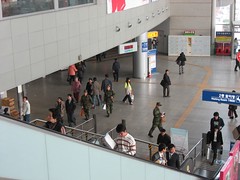

Often, the uniforms come with a girl, and go about their shopping oblivious to the others around them, but it does lead to some slightly more surreal situations. The most notable of which during my time here was probably when, after waiting for five minutes in the foyer of a movie theatre with a bunch of other civilians and a group of about fifteen male navy cadets, a roughly similar size group of female cadets entered at the opposite end, apparently coincidentally. There followed by a few moments of embarrassed stand-off across the foyer before finally one of the females saluted and before you knew where you were there were two approximate lines of young Korean people smartly saluting one-another while the civilians in the middle watched in somewhat bemused silence. Actually, it was somehow very Korean and as the only foreigner there I felt like I was intruding on a private family moment, which I suppose I was. I found myself wishing I had a flag.
Now at the time of the navy saluting incident, I couldn't help but notice that the men all had briefcases with them, and more to the point, when I came to think about it, didn't those I saw walking around the street normally have them too? I started paying more attention and sure enough, the observation seemed to hold true.
Yesterday I was eating on the second floor of a restaurant in the largely pedestrianised retail centre of Nampodong when an army truck suddenly rolled by as though it were the most natural thing in the world. Random incident - but as I watched to see if anything more substantial would advance down the street - because in Korea you just never know - I once again noticed a succession of navy men and their briefcases passing by. Which got me onto this subject again, and now it's bugging me because nobody seems to know why they always seem to be carrying briefcases and what on Earth is in them.
I'm sure there's a very simple explanation but I have to know...


Often, the uniforms come with a girl, and go about their shopping oblivious to the others around them, but it does lead to some slightly more surreal situations. The most notable of which during my time here was probably when, after waiting for five minutes in the foyer of a movie theatre with a bunch of other civilians and a group of about fifteen male navy cadets, a roughly similar size group of female cadets entered at the opposite end, apparently coincidentally. There followed by a few moments of embarrassed stand-off across the foyer before finally one of the females saluted and before you knew where you were there were two approximate lines of young Korean people smartly saluting one-another while the civilians in the middle watched in somewhat bemused silence. Actually, it was somehow very Korean and as the only foreigner there I felt like I was intruding on a private family moment, which I suppose I was. I found myself wishing I had a flag.
Now at the time of the navy saluting incident, I couldn't help but notice that the men all had briefcases with them, and more to the point, when I came to think about it, didn't those I saw walking around the street normally have them too? I started paying more attention and sure enough, the observation seemed to hold true.
Yesterday I was eating on the second floor of a restaurant in the largely pedestrianised retail centre of Nampodong when an army truck suddenly rolled by as though it were the most natural thing in the world. Random incident - but as I watched to see if anything more substantial would advance down the street - because in Korea you just never know - I once again noticed a succession of navy men and their briefcases passing by. Which got me onto this subject again, and now it's bugging me because nobody seems to know why they always seem to be carrying briefcases and what on Earth is in them.
I'm sure there's a very simple explanation but I have to know...
Subscribe to:
Posts (Atom)
